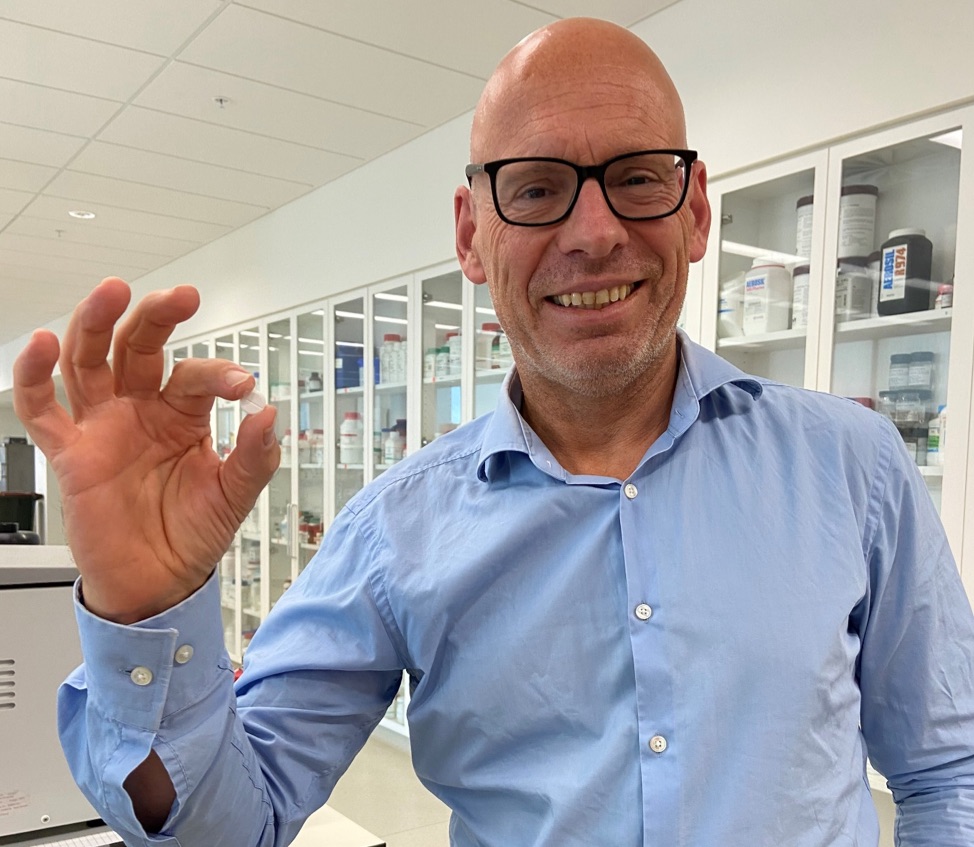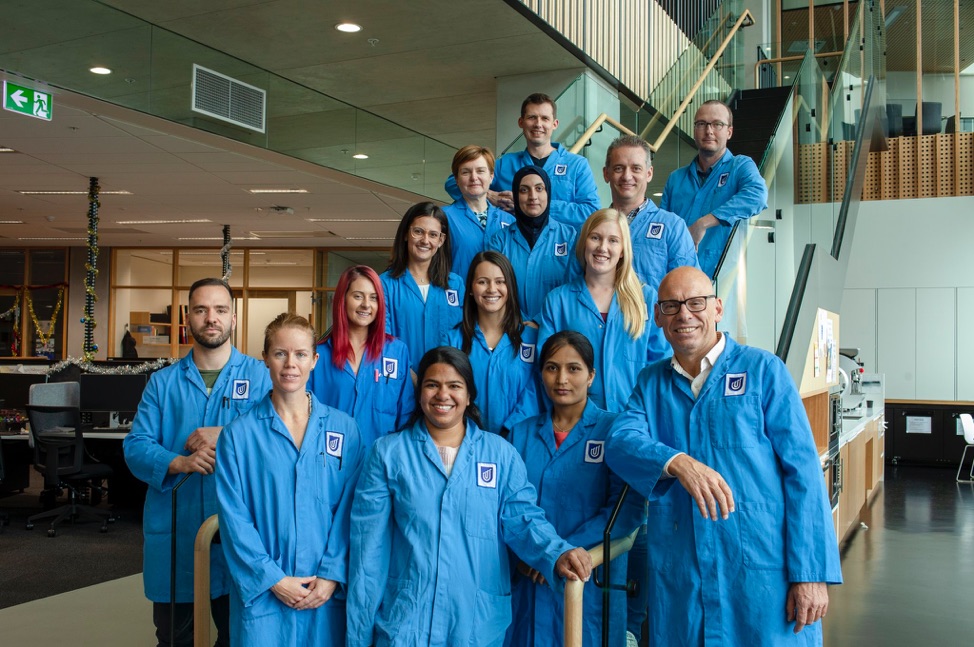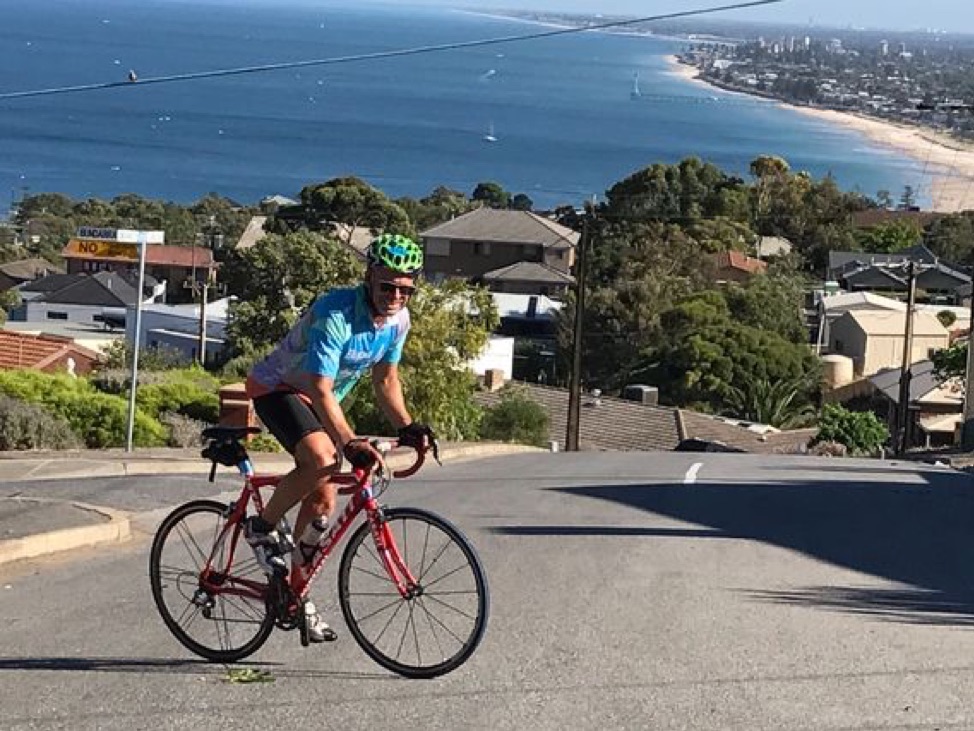- connecting our global network
01 July 2020
Professor fighting for better cancer treatments after his own diagnosis

Internationally renowned biopharmaceutical researcher and head of the UniSA Clinical and Health Science Nanostructure and Drug Delivery Group (NADD), Professor Clive Prestidge’s research has recently taken on personal significance after being diagnosed with bowel cancer early last year.
Clive completed a national bowel screening test and even though it showed the presence of blood in his sample, he went into his scheduled colonoscopy expecting a clear diagnosis. As a dedicated cyclist with very high fitness levels he reasoned that there could be many other reasons for traces of blood besides cancer.
Receiving the news that he had bowel cancer felt completely surreal.
After what he expected to be a routine procedure at 5.00pm on a Friday afternoon, Clive woke up to the news that a growth had been found that looked serious and that he was being referred to see a surgeon the following week.
“I didn’t expect it. The previous weekend I’d ridden 200 kilometres in the charity ride for the Tour Down Under. I felt fighting fit,” Clive says.
“They showed me the pictures they’d taken during the procedure and a few expletives came out. Of course, once I got the news, I didn’t sleep for the next few days.”
By the following Tuesday the pathology confirmed it was colorectal cancer.
“They told me half my colon would need to be removed. Of course, you start imagining the worst scenario – I’m not going to make it. Thinking of my family and young daughter, I started to tear up… My thoughts were all over the place.”

Clive started to question the young colorectal specialist on his experience, ‘how long have you been doing this and how many of these surgeries have you performed?’. He was stunned to hear the surgeon had performed more than 500 bowel cancer surgeries in the last two years.
“This was just one surgeon in Adelaide” says Clive. “Imagine how many other surgeries are being performed in this city alone! The growth of this disease is significant.”
After surgery and nine days in hospital, he was finally discharged to recover at home.
“Fortunately, chemotherapy was not part of my treatment” Clive says. “One of the concerning issues is just how compromised chemotherapy patients’ immune systems become. They are susceptible to getting very sick from basic colds and flus, let alone something like coronavirus.”
Clive’s experience has made him even more passionate about finding a breakthrough in improved cancer treatment, striving to achieve a less invasive approach of drug delivery through a new development of oral chemotherapies with improved absorption, lower toxicity, and maximum reduction in tumour growth.
“Working in this field, the stories that you come across are compelling. It all feels very close to home.”
Clive leads a drug delivery research group focused on pharmaceutical formulation and says the lipid-based technology he and his team are working on not only changes the way chemotherapy drugs are absorbed in the body but also “crosses the biological barriers and changes their distribution to make them safer.”

“Current bowel cancer drugs can cause mucosecal and gut damage. The cocktail of highly toxic drugs is very severe and hits the whole body. The gastrointestinal system becomes white and inflamed as the chemotherapy destroys the gut’s lining and people can get life-threatening diarrhea.”
“If our oral drug delivery enables more site-specific, targeted treatment then the cancer patient’s recovery is faster and long-term side effects are limited.”
While precision or personalised cancer treatments are very much in the spotlight, these new oral delivery systems will serve to enhance the distribution pathway of the drugs we currently use.
“It’s true, some of the best new medicines are targeted therapies” says Clive. “But most standard practice still uses traditional chemotherapy and is likely to for some time, and so we need to improve the efficacy-toxicity balance of existing drug delivery methods”.
On the other side of his health crisis, Clive is back to cycling every week and says the things he now values most are his family, his friends, his health, and the work that he gets to do.
“If things hadn’t have gone the way that they did, my story could look much different.”
Together there is more we can do

UniSA’s Cancer Research Institute brings together over 350 leading biomedical, genetic and pharmacological experts located in the UniSA Cancer Research building on North Terrace. With so many minds at work, the effort is moving fast, and yet, for many cancer patients, it’s still not fast enough.
Without the development of new and better prevention, detection, diagnostics, and treatments, cancer is projected to increase exponentially in the future. Time is critical, and delays have a significant impact on survival outcomes. We need your help to be in a position where we can bring our world-leading discoveries and treatments to patients sooner so we can save lives faster.
Support the ground-breaking research Clive and his team are doing to develop a novel chemotherapy solution in oral form and other cancer research, by donating at giving.unisa.edu.au.




